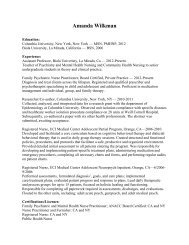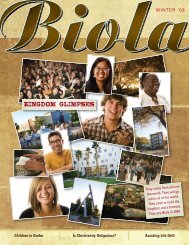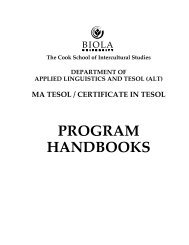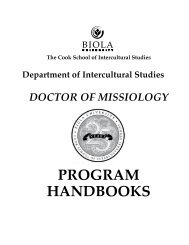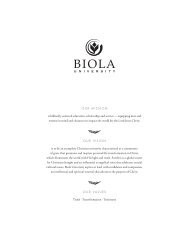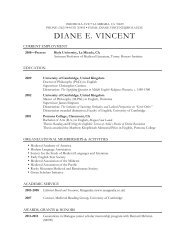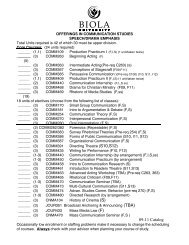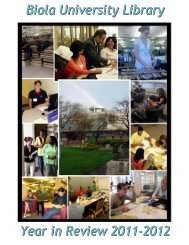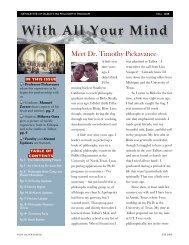GRADUATE STUDENT HANDBOOK - Biola University
GRADUATE STUDENT HANDBOOK - Biola University
GRADUATE STUDENT HANDBOOK - Biola University
You also want an ePaper? Increase the reach of your titles
YUMPU automatically turns print PDFs into web optimized ePapers that Google loves.
traumatic to the person‘s family, friends, and larger community as well. This policy pertains to<br />
incidents of sexual assault between students as well as sexual assaults against students by non-student<br />
perpetrators. To report a violation of this policy, follow the procedures outlined below. For reference,<br />
sexual harassment is defined as unwelcome or offensive sexual advances, requests for sexual favors,<br />
unwanted or uninvited verbal suggestions or comments of a sexual nature, or objectionable physical<br />
contact. In some cases, sexual assault may also constitute sexual harassment. For information regarding<br />
reporting issues of sexual harassment, as opposed to sexual assault, see the <strong>University</strong>‘s Sexual<br />
Harassment policy.<br />
I. Definitions<br />
Sexual Assault (Category I) is defined as engaging in sexual intercourse with any person without that<br />
person‘s consent. Sexual intercourse is the penetration, however slight, of the vagina, or anus with any<br />
object or body part and of the mouth with a sexual body part or sexual object.<br />
Sexual Assault (Category II) is defined as the act of making sexual contact with the intimate body part of<br />
another person without that person‘s consent. Intimate body parts include the sexual organs, the anus,<br />
the groin or buttocks of any person, or the breasts of a female. Sexual contact can occur over clothing.<br />
Consent is defined as an unambiguous and willful participation or cooperation in an act or as an attitude<br />
that is commonly understood to be consistent with the exercise of free will. Consent requires participants<br />
who are fully conscious, are equally free to act, have clearly communicated their willingness,<br />
cooperation, or permission to participate in a specific sexual activity, are positive and clear in their<br />
desires, and are able to cease ongoing consensual activity at any time. Refusal to consent does not have<br />
to be verbal; it can be expressed with gestures, body language or attitude. A prior sexual history between<br />
the complainant and respondent does not constitute consent. Consent is not freely given if one of the<br />
following applies:<br />
a. The individual is unable to make an informed decision as a result of alcohol or other<br />
drugs (including but not limited to predatory drugs or prescribed medications); or<br />
b. The individual is unconscious, asleep, or suffering from shock; or<br />
c. The individual is under the age of eighteen and therefore legally unable to give consent;<br />
or<br />
d. The individual has a known mental disorder or developmental or physical disability, and<br />
therefore legally unable to give consent.<br />
It is important to note that in the <strong>University</strong> process, use of alcohol does not diminish personal<br />
responsibility or act as a mitigating factor in disciplinary sanctions should a violation be found to have<br />
occurred.<br />
II. College and Community Resources<br />
The needs of someone who has been sexually assaulted vary from person to person and may vary over<br />
time. The <strong>University</strong> offers services and external resources, many of which may be accessed 24 hours a<br />
day, so that a person may choose what she or he would find most helpful and healing.<br />
Revised 3.9.2012 41



